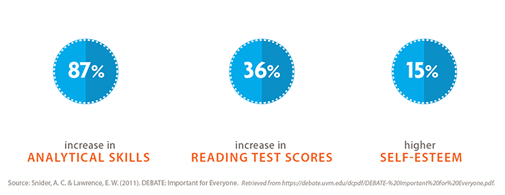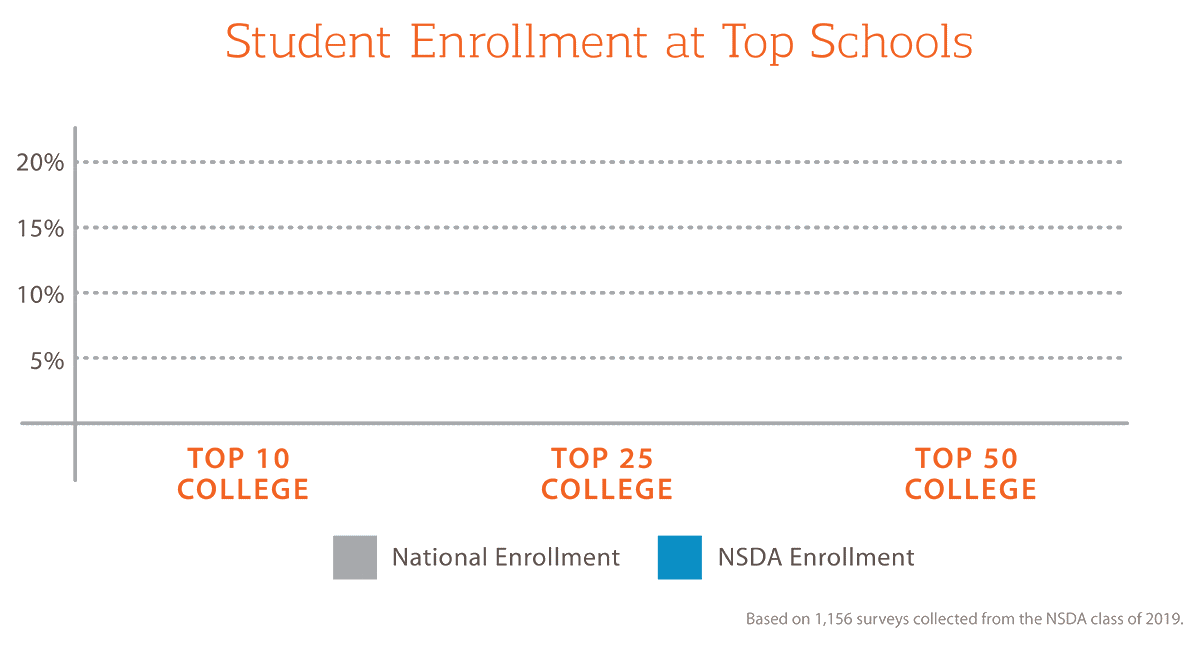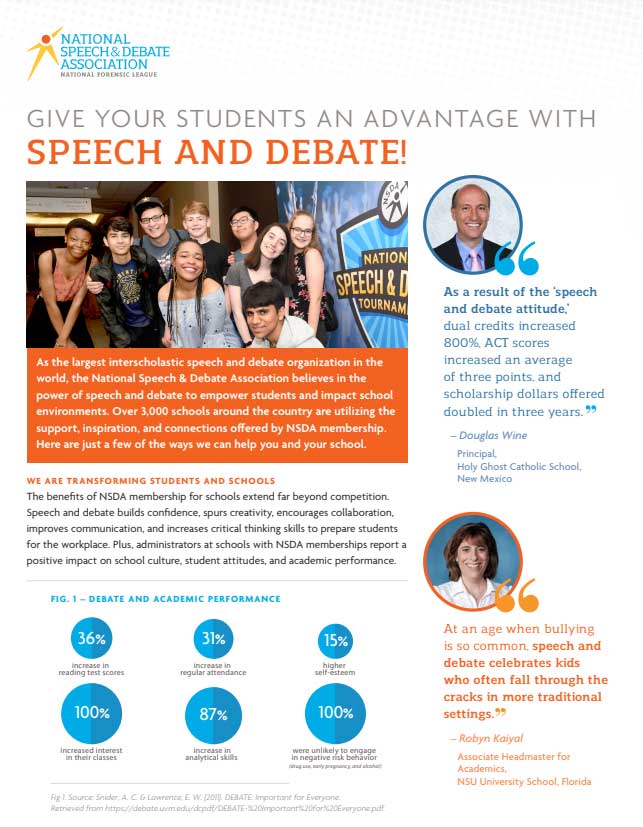How to Pitch a Program
How to advocate for a team
Speech and debate is a life-changing activity that should be available for all students, but sometimes you need help making the case. NSDA membership is school-based. Whether you’re hoping to establish a class or an after-school program, getting the support of administrators is key. This guide contains resources to help adults advocate for a new program. We encourage students to utilize this in-depth guide to starting a program.

Determine your audience
Begin by determining the target audience of your pitch. Just like in speech and debate, knowing who the judge is in the back of the room will help you tailor your performance to win the ballot. You will definitely want to involve an administrator, possibly also an activities director. If you’re pitching a class, also consider including curriculum leaders. Reach out to front office staff to collect contact info if you aren’t familiar with school leadership. They also likely can provide guidance on the process for starting a team or class at the school.
If you are pitching a school district, let us know. Getting full-district commitment to speech and debate is a huge deal and is an incredible way to anchor the activity to school culture for years to come. The NSDA partners with school districts and offers bulk membership discounts. Contact us at info@speechanddebate.org for more info.
Reach out via email
Use our email template to reach out about starting a program and attach an administrator letter so they can hear from a peer!
Line up your partners
Consider who from the community can help persuade decision makers. Parent and student interest drive programming. Explore involving students or parents in the pitch, be that via testimonials, surveys about their interest, or by inviting them to speak in person.
If other schools in the area have programs, inquire if their admin would be willing to advocate on your behalf, or whether their students might give a quick performance at your meeting to showcase the skills your students could learn. Not sure whether teams in your area have a program? Email info@speechanddebate.org with your school name, school district, city, and state.
If you can go into the meeting with an idea for who will coach the team, that can make a difference! If you’re not volunteering, visit our guide for tips for finding a coach.

Find your talking points
At least part of your pitch should address the impact of speech and debate on academic performance, school goals, and career-readiness. Use the following talking points to put together your pitch. For more resources, including NSDA flyers, letters, and PowerPoint templates, visit our advocacy page. Would a message from the NSDA be helpful? Reach out when you’re ready to Annie Reisener, Director of Membership at annie.reisener@speechanddebate.org with information about your goals and how we can help.
ACADEMIC PERFORMANCE
-
- Higher GPAs.
- Higher SAT Math and Evidence-based Reading and Writing exam scores.
- Increased likelihood to meet the College Board’s benchmarks for college readiness.
- Admission to top universities.
- Higher student confidence and self-esteem.
- Increased engagement in the classroom.
- Increased likelihood to graduate.
SCHOOL
Studies and administrator testimonials also demonstrate school-wide benefits to investing in speech and debate, including:
-
- Increased interest in classes.
- Increased attendance rates.
- Higher graduation rates.
- Decreased negative student behavior.
- Increased school pride.
CAREER READINESS
Speech and debate gives students the skills to excel in whatever profession they choose. From Supreme Court justices and politicians to doctors, lawyers, teachers, and actors, countless alums credit speech and debate as a crucial tool in their tool box.
According to a LinkedIn survey of more than 660+ million professionals, the most in-demand soft skills are creativity, persuasion, collaboration, adaptability, and emotional intelligence, all of which are developed through speech and debate.
-
- Creativity: Speech and debate empowers students to make artistic choices about how they bring words to life.
- Persuasion: Students learn how to best convince an audience in the face of equally well-informed, persuasive competition.
- Collaboration: Students work with teammates and coaches to craft stories, create arguments, build upon feedback, and perfect their performances.
- Adaptability: Students learn to think on their feet and tailor a performance to a given audience.
- Emotional Intelligence: Students learn to see both sides of an issue and to use appropriate strategies for questioning things they do not understand.


Connecting to Your School’s Goals
Every school has a set of goals or priorities. If you’re not able to determine those through your school directly, look to the district at large. Take those goals and analyze how speech and debate fits in. Then include this information in your pitch to your administration so it’s clear how offering speech and debate benefits the school at large. The following goals are sourced from a real school and examined through the speech and debate lens.
EXAMPLE 1
School Goal: Analysis every day, in every class.
Speech and debate achieves this by:
- Requiring debate students and public speakers to analyze sources of evidence to examine their credibility, possible biases, methodology, recency, and relevance.
- Training speech students to critically read literature to identify theme, character motivations, and arguments to bring characters to life.
- Encouraging students to review their ballot feedback from in-class competition or tournaments to evaluate where they should focus their efforts to improve results.
EXAMPLE 2
School Goal: Increase the sense of belonging students feel at school.
Speech and debate achieves this by:
- Offering students a welcoming platform to express their opinions, passions, and lived experiences.
- Giving students the opportunity to collaborate and express their creativity, whether they work individually or in pairs.
- Enabling students to track their progress, letting them visualize how their experience has helped them and their teammates grow.
EXAMPLE 3
School Goal: Live out excellence through unity, equity, and integrity
Speech and debate achieves this by:
- Holding students to a national Code of Honor, which celebrates humility, equity, integrity, respect, leadership, and service.
- Training students to challenge their beliefs when presented with new information and approach issues from multiple diverse perspectives.
- Encouraging students to both share their own lived experiences and appreciate how their viewpoint can change when they listen to others with an open mind.
SUPPORT INFRASTRUCTURE
Let admins know there is an existing local and national infrastructure of support. By joining the NSDA, schools gain access to educational resources, competitive opportunities, and support from experts. We can train anyone to coach, from grandparents to math teachers. No existing knowledge of speech and debate is required.
PRICING AND FUNDING
Membership is school based. Schools purchase an annual membership, as well as one-time memberships for coaches and students for their access to resources and the Honor Society. Share a visual breakdown of pricing and the list of benefits. Membership grants are available for new programs and Title I schools. Apply online before you join!
Polish your pitch
Print off some glossy materials like our Honor Society flyer and administrator handout to leave behind or reference in your meeting. You can also contact us at info@speechanddebate.org to request printed advocacy materials.
Follow up on your meeting
About a week after your meeting, send a follow up email to touch base and establish a timeline for a decision if you didn’t already do so during the meeting. Continue to follow up as needed until you receive a response.

We’re ready to join!
Welcome! Coaches can take our free online Intro course to learn the basics of coaching. Then pay for your school membership and get started changing lives through speech and debate.


